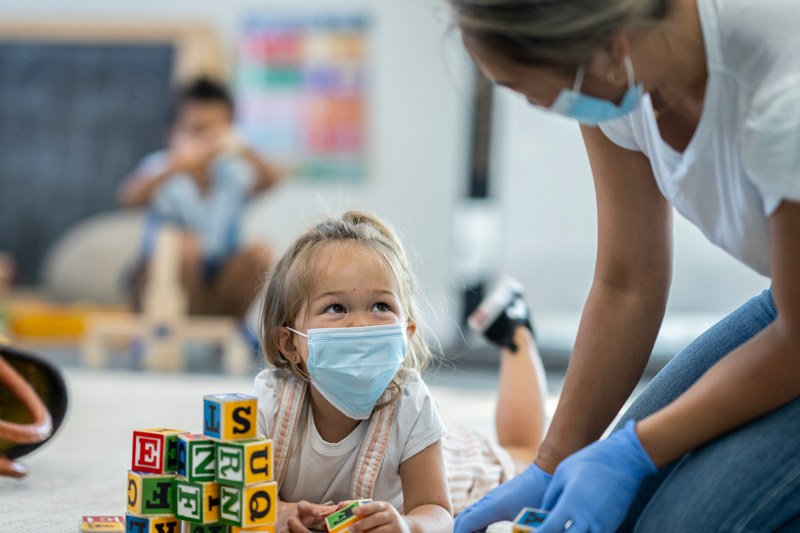Posted: August 10, 2020
COVID-19 has presented us with extremely challenging and stressful times, and it is more important than ever to assess and support the social-emotional development of the children in your care as well as prioritize your own personal well-being.

Author's note: This article was informed by current recommendations provided by the Centers for Disease Control and Prevention (CDC). Because recommended practices can change, please be sure to visit the CDC's page for child care programs or your state's Department of Health Services to stay up-to-date on best practices.
Preventing the spread of COVID-19
Because of the ease of which COVID-19 can be transmitted, prevention strategies are of the utmost importance. The CDC recommends that child care centers: implement everyday preventive strategies (e.g., frequent handwashing), practice social distancing, clean and disinfect objects and surfaces, modify drop-off and pick-up procedures, implement arrival screening procedures, require children and staff to stay home when sick, have a plan for if a child or staff member becomes sick, and have staff and children over the age of 2 wear masks. Children under the age of 2 should NOT wear masks due to risk for suffocation.
It is strongly recommended that you visit the CDC website for additional information, resources, and examples for the implementation of these recommendations. Additionally, the CDC provides guidance for acquiring needed resources to prevent the spread of COVID-19.
Promoting social-emotional development
These are extremely challenging and stressful times and it is important to keep in mind that children in your care have been impacted too. Children may have had their transitions disrupted, be unable to visit friends or relatives, and are likely picking up on cues from adults that this is a worrisome time. Additionally, because stress often negatively impacts parents' ability to parent effectively and with warmth, these children may be exposed to more conflict and stress than they normally would. This is why it is an extremely important time to do all that you can to help support children's social-emotional development. While necessary precautions to prevent the spread of COVID-19 like mask wearing and social distancing can make this more challenging, it is not impossible. If you have an upset child, you absolutely should comfort them. Depending on the child's age this may involve picking them up or giving them a hug. This can be done safely by wearing a buttoned-down long-sleeve shirt, long hair in a ponytail, and washing your hands (and any other part of your body that has come into contact with a child's tears) after you have consoled the child.
Children typically develop emotional knowledge and regulation skills by observing the facial expressions of others. Again, this is likely difficult for children when the people surrounding them are wearing masks. Because of this, it is even more important than usual that you are able to verbally express how you are feeling ("I am so happy that you helped your friend") and take time to check in with the children in your care to see how they are feeling. Also, when reading stories with children, try to draw attention to how the characters are feeling and clues to how they're feeling ("This person looks sad to me because they are frowning"). Try to make these story times engaging and ask children questions to help build social-emotional competencies like: "How do you think this person is feeling? How would you feel in this situation? What do you think this person should do now?" COVID-19 has undeniably presented some unique challenges to promote children's social-emotional development, but it can still be done, and this is a time when children really need support socially and emotionally.
Taking care of your own well-being
Of course, this is likely to be a very challenging situation for you as an educator and as an individual. You may have financial concerns, be worried about your health or the health of loved ones, and feel overwhelmed for a whole host of reasons. You are tasked with an incredible responsibility of caring for children in such a difficult time. It is important that you are taking note of your own health and doing what you can to support your mental and emotional well-being. Below are some suggestions that have been shown to support individual well-being:
- Eat healthy, exercise, and get enough sleep.
- Find time to decompress after the workday and allow yourself not to think about work. Whether it's talking a long walk, speaking with a partner or family member, practicing mindfulness, or reading, it is so important that you are able to find something that brings you joy, reduces your stress, and helps you recharge after a tough day.
- Similarly, it may seem that we have been inundated with negative news. While it is important to remain informed through trusted sources (e.g., CDC), try to find times to disconnect from the negative news around you and engage in activities you enjoy.
- Connect with your co-workers in a safe and responsible manner. It is important that you know that you aren't alone and there are people experiencing similar things to you.
- If you feel you are struggling let someone know. Reach out to your director and tell them what is going on. Sometimes just letting someone know that you need assistance or are having a challenging day can make you feel better.
This is an extremely unique and difficult situation for so many reasons. Stay healthy and safe and thank you for all that you do!
For additional information on managing the COVID-19 situation within child care centers you can check out the Centers for Disease Control and Prevention's Guidance for Child Care Programs that Remain Open, Better Kid Care's COVID-19 Information page, and Zero to Three's Coronavirus Resources for Early Childhood Professionals.

